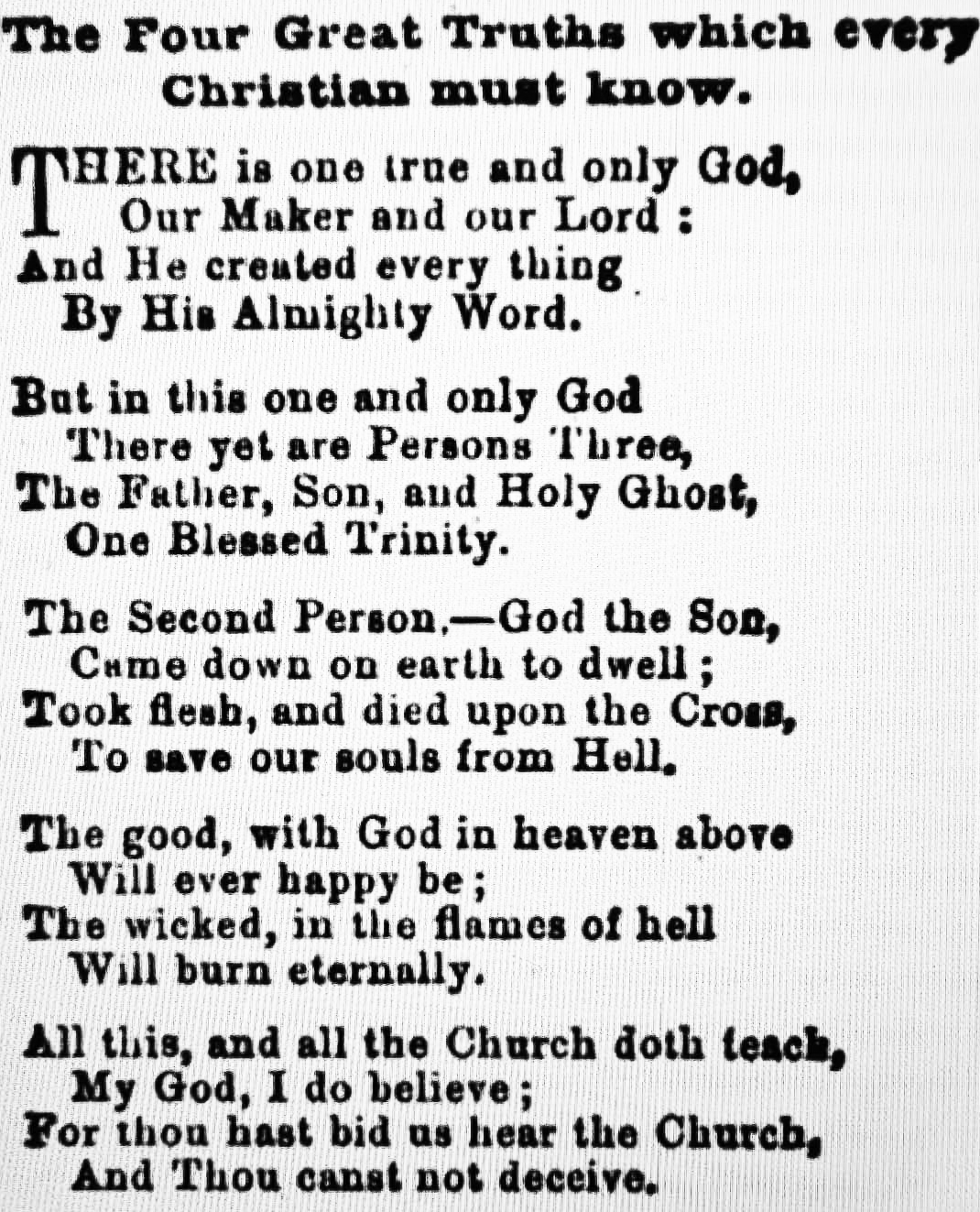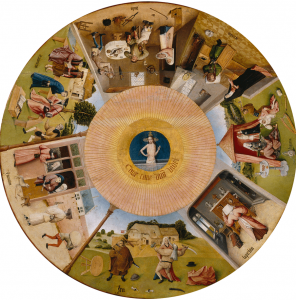Return to Catechetics parent page

There is no music in this section, because the topic makes music inappropriate. But there is rhyme able to be memorized.

| Prepare for Death-you’ll surely die one day; But when, or where, or how, no man can say. |
Fear Judgment-to a wise and mighty Lord You must account for thought, & deed, and word. |
| Remember Hell to shun it-dark despair, Fire, and the worm that never dies, are there. |
Look up to Heav’n!-if you are firm and true In serving God, its joys are all for you. |
| (1.) Pride is inordinate esteem that one Has for himself, or what by him is done. |
(Vanity means inordinate desire That other folks may praise us or admire.) |
| (2.) Avarice is immod’rate love of gain Which we have got, or which we would obtain. |
(3.) Lust means all impure pleasure, be it sought By look, by word, by action, or by thought. |
| (4.) Anger is passion quick and violent, That moves the will some grievance to resent. |
(5.) Gluttony is abuse of drink and meat; It does not eat to live, it lives to eat. |
| (6.) Envy’s regret that others should do well, As if their welfare ‘gainst our own did tell. |
(7.) Sloth is a cold disrelish that withdraws The sluggish heart from God and from His laws. |
Hope. Charity. Faith. Justice. Temperance. Fortitude. Prudence.

Desperation. Envy. Infidelity. Injustice. Wrath. Inconstancy. Foolishness.
| Vice | Latin | Virtue | Latin |
|---|---|---|---|
| Lust | Luxuria | Chastity | Castitas |
| Gluttony | Gula | Temperance | Moderatio |
| Greed | Avaritia | Charity (Generosity) | Caritas (Liberalitas) |
| Sloth | Acedia | Diligence | Industria |
| Wrath | Ira | Patience | Patientia |
| Envy | Invidia | Gratitude | Gratia |
| Pride | Superbia | Humility | Humilitas |

The Four Cardinal Virtues
- Prudence – Right Reason in Action. The Virtue that disposes practical reason to discern our true good in every circumstance and to choose the right means of achieving it
- Justice – The constant and firm will to render to each person, whether God or neighbor, what is their due. Toward God, the virtue of religion. Toward men, disposing one to respect the rights of each and to establish in human relationships the harmony that promotes equity with regard to persons and to the common good.
- Fortitude – Ensuring firmness in difficulties and constancy in the pursuit of the good. Strengthens the resolve to resist temptations and to overcome obstacles in the moral life. Enables one to conquer fear, even fear of death, and to face trials and persecutions.
- Temperance – Moderating the attraction of pleasures and providing balance in the use of created goods. Ensures the will’s mastery over instincts and keeps desires within the limits of what is honorable.

like God and angels, nor is man exclusively material,
a mere “ghost in the machine”,
man is truly a spiritual-material composite.

over the Sensitive Appetites, there is Chaos.
(But for God, the human-level distinction between intellect and will does not pertain.)

Proper exercize even of the irascible appetites is necessary
for man to fulfill God’s purposes in creating his nature good.
St. Francis de Sales, Treatise on the Love of God, Chapter II, “How the Will Variously Governs the Powers of the Soul“.

The Seven Deadly Sins
Each panel in the outer circle of Hieronymous Bosch’s The Seven Deadly Sins and the Four Last Things depicts a different sin. Clockwise from top (Latin names in brackets):
- Gluttony (gula): A drunkard swigs from a bottle while a fat man eats greedily, not heeding the plea of his equally obese young son.

- Sloth (acedia): A lazy man dozes in front of the fireplace while Faith appears to him in a dream, in the guise of a nun, to remind him to say his prayers.

- Lust (luxuria): Two couples enjoy a picnic in a pink tent, with two clowns (right) to entertain them.

- Pride (superbia): With her back to the viewer, a woman looks at her reflection in a mirror held up by a demon.

- Wrath (ira): A woman attempts to break up a fight between two drunken peasants.

- Envy (invidia): A couple standing in their doorway cast envious looks at a rich man with a hawk on his wrist and a servant to carry his heavy load for him, while their daughter flirts with a man standing outside her window, with her eye on the well-filled purse at his waist. The dogs illustrate the Flemish saying, “Two dogs and only one bone, no agreement”.

- Greed (avaricia): A crooked judge pretends to listen sympathetically to the case presented by one party to a lawsuit, while slyly accepting a bribe from the other party.

The Four Last Things
-
- In Death of the Sinner, death is shown at the doorstep along with an angel and a demon while the priest says the sinner’s last rites.

- In Death of the Sinner, death is shown at the doorstep along with an angel and a demon while the priest says the sinner’s last rites.
- In Glory, the saved are entering Heaven, with Jesus and the saints, at the gate of Heaven an Angel prevents a demon from ensnaring a woman. Saint Peter is shown as the gatekeeper.

- In Judgment, Christ is shown in glory while angels awake the dead.

- While in the Hell demons torment sinners according to their sins.

This shortlink:
http://www.sing-prayer.org/p/152
Return to Catechetics parent page
